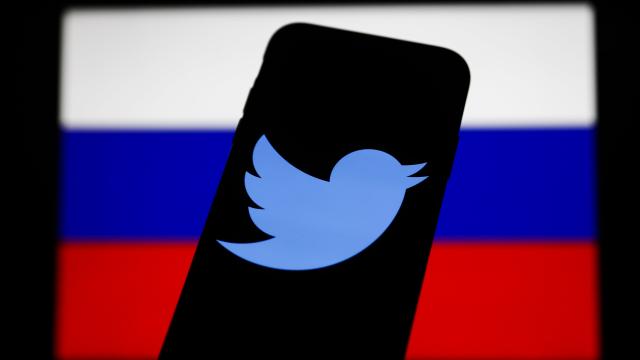Russian diplomats on social media, Twitter in particular, are routinely spreading disinformation about the war in Ukraine, opening up another can of worms for social media companies that already struggle to curb the politically disingenuous and outright harmful activities of government officials.
Bloomberg first reported the widespread campaigns of various embassies’ social media accounts that continue to propagate misinformation, allowed to remain online largely due to the veneer of legitimacy conferred by their governmental affiliation.
The Russian embassy in the UK has been tweeting daily about the war in Ukraine, often with the purpose of muddying the waters around atrocities committed by Russian troops. On Wednesday, the embassy account posted unverified video of what they claimed was a fight between a Ukrainian and another man on a bus in Rome, writing “Ukrainians in Rome saying ‘thank you’ for the refuge. Coming soon to a city near you.”
The Russian Mission in Geneva has regularly been posting about “#Fakes” regarding weapons used by Russian forces, especially against civilian targets. The only restriction for users entering that Twitter page is an age-related warning. Other accounts continue to relay debunked information. The Russian Arms Control Delegation in Vienna Twitter account has posted and retweeted multiple times about disproven claims of US having bioweapons in Ukraine.
The same Twitter account for the Russian embassy in the UK account tweeted a deceptive interpretation of a screenshot Thursday of a tweet from Mykhailo Podolyak, an advisor to Ukrainian President Volodymyr Zelenskyy. The original tweet talked about holding a “special round of negotiations” to allow for the evacuation of troops, civilians and the wounded, “To save our guys, Azov, military, civilians, children, the living & the wounded. Everyone.” The Russian embassy account missed that last part, instead offering a ghoulish and distorted reading of that tweet. The embassy tweeted, “Azov and military first, civilians and children later. Clear demonstration of [Ukrainian] priorities.” That post was retweeted by the Russian Ministry of Foreign Affairs.
Twitter did not respond to a request for comment whether these accounts have violated Twitter’s terms of service, nor whether it has any plans to curtail posts by Russian diplomats that contain misinformation. Twitter has previously said it would stop amplifying Russian government accounts posting about prisoners of war. It has not put a quash on government accounts tied to the Kremlin that are actively and repeatedly posting misconstrued, distorted or outright false information. The company has long struggled to find where it stands when official accounts of politicians and governments actively post misinformation or even incite violence against others.
Azov and military first, civilians and children later. Clear demonstration of 🇺🇦priorities. pic.twitter.com/En9RELFiGx
— Russian Embassy, UK (@RussianEmbassy) April 21, 2022
Despite Twitter banning prisoner of war pictures from state-owned accounts, it has yet to combat any of the other posts routinely spat out by government accounts. Despite the mum response by Twitter, some users have been fighting back against embassy propaganda, regularly posting video and other evidence in response to Russian claims.
Other platforms aren’t faring much better. Facebook’s parent company Meta has repeatedly changed its rules regarding disinformation coming out of Kremlin backed sources, but it still struggles to moderate content. Russia has already retaliated against both Google and Twitter for their efforts after the European Union banned Russian state media, which has long been adept at causing confusion, especially in foreign elections.
And none of that has been enough to stop official accounts from confusing the public. The Russian embassy in the USA has linked to Facebook video from state media org Russia Today in its posts and tweets about alleged “illegal” unexploded munitions they argue are either illegal or banned. This, of course, ignores the fact that Russia has been repeatedly shown to use munitions banned by international treaties.
While there have been legitimate reports of Ukraine hitting back with similarly banned weapons, the attempt to mislead the public about what’s happening in Ukraine has created a war of information that the US government still struggles to get a handle on.
It has been a struggle for the social media platforms to control disinformation, even before Russia invaded Ukraine. Russian accounts recently posed as fake journalists to level false information at Ukrainian Facebook accounts.
Editor’s Note: Release dates within this article are based in the U.S., but will be updated with local Australian dates as soon as we know more.
